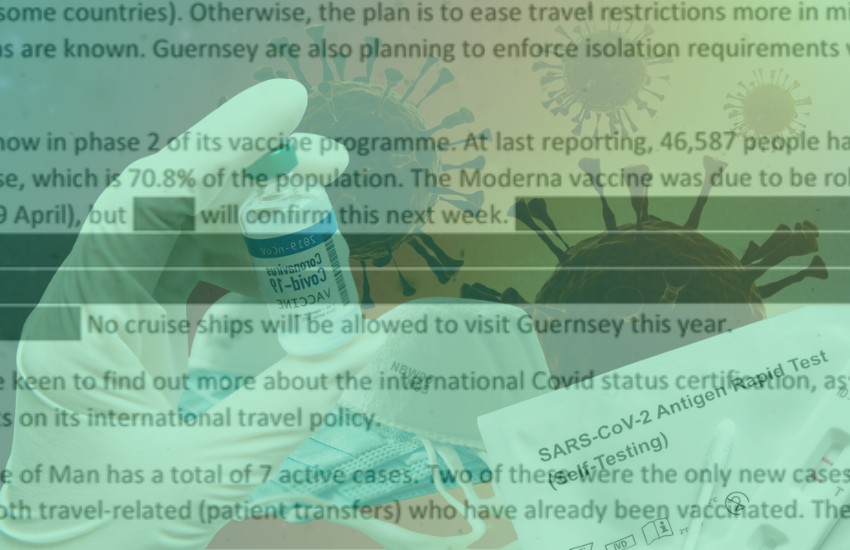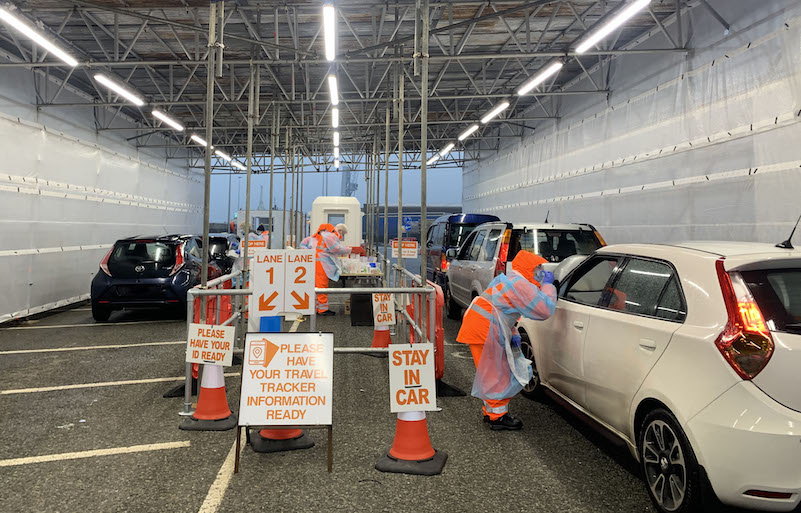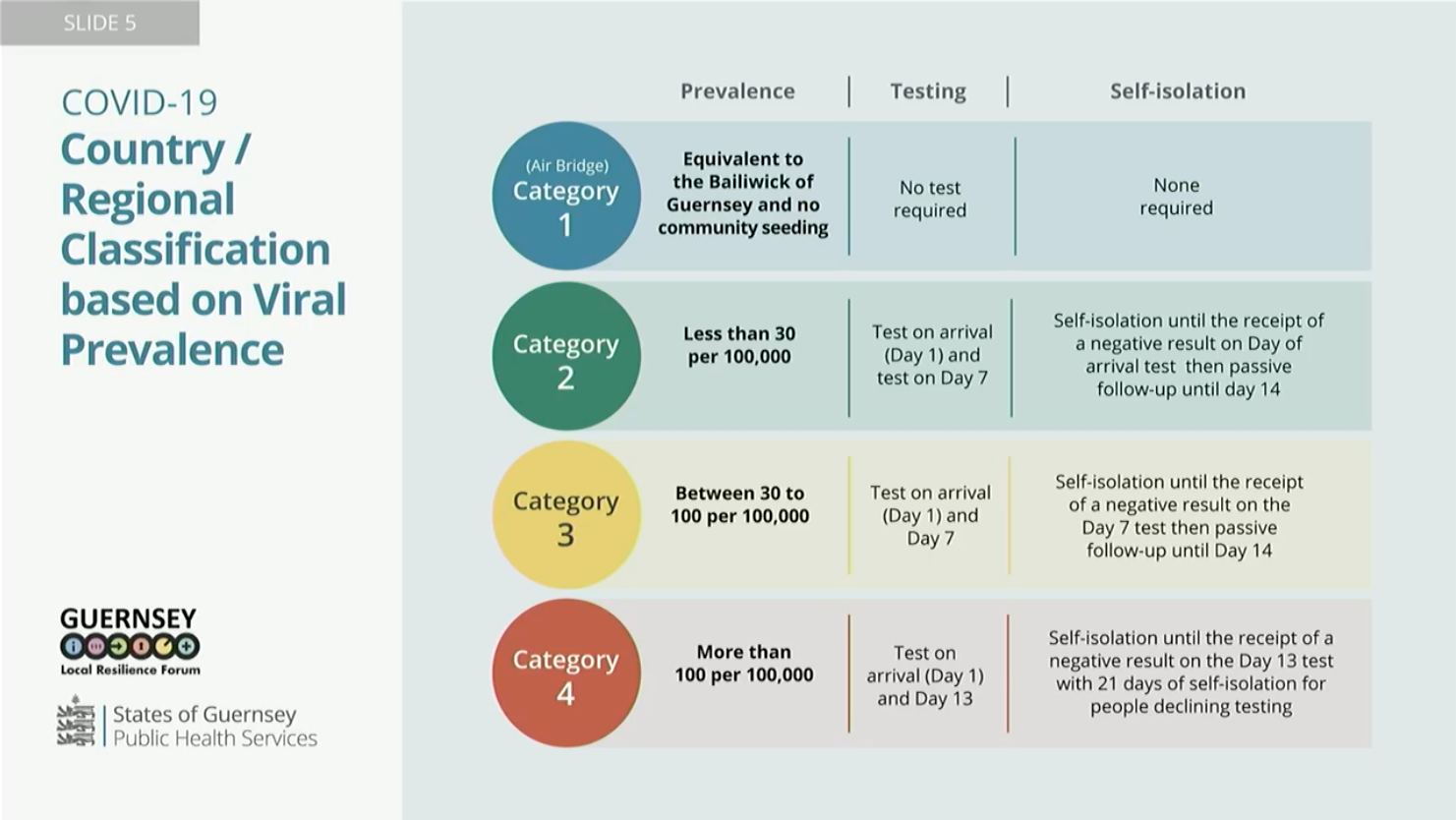


Drugs stockpiles, problems with medical equipment supplies, vaccination and travel restrictions were at the heart of discussions with the UK being held as the second phase of the Covid-19 pandemic unfolded, newly released minutes show.
The UK’s Ministry of Justice instigated the Covid-19 Contact Group in April 2020 to share information and coordinate responses with Guernsey, Jersey and the Isle of Man.
Minutes of those meetings for February, March and April 2021, a period when Guernsey was in the midst of the second lockdown, were released after a freedom of information request to the MoJ by Express.
While the States in its communications and review of how Guernsey handled the pandemic has acknowledged the support of the UK Government, the details of how that unfolded have so far largely been overlooked.

At the start of February, there were 306 known cases of Covid-19 in Guernsey and five patients in hospital, schools were shut and four educational locations had been deep-cleaned.
More testing facilities were being built at the harbour. Vaccination rates were reported as being 10.2 per 100.
The UK’s Department of Health and Social Care has been stockpiling over 50 supportive medicines and supplies were “secured” until March.
Just a week later it reported shortages of medicines such as sedatives and muscle relaxants and that it had to use those stockpiles for the first time. It was also diverting medicine earmarked for the stockpile into business as usual supplies.
Concerns about pipette tip supplies, so crucial in things like blood and covid tests, were on the agenda and work was under way to clarify stocks.
By this point Guernsey had been in lockdown since 23 January and was developing an exit strategy.
“Guernsey also reported problems with drug supplies by UPS, but the situation is gradually improving,” the minutes from 9 February noted.
A week later, the UK told the meeting about the results of trials for extending the use of certain drugs outside of intensive care.
Guernsey reported the first Covid death of the second wave.
New cases were dramatically reduced from previous week while sole traders had been allowed to return to work.
The vaccination rollout was “progressing well”, now at 24.2 doses per 100.
Both Guernsey and Jersey had sent comments to the DHSC on the latest vaccine memorandum of understandings.
During the meeting on 23 February, it was noted how work was happening on addressing the issue of vaccinating UK residents currently in Guernsey.
“DHSC colleagues are considering a data workaround, as Guernsey does not have access to the NHS’s National Immunisation Management Service vaccine tracking software.”
Jersey had already started to vaccinate UK residents.
Active cases in Guernsey were down to 49 and the island was in stage one of the release from lockdown.
It was noted that both Channel Islands were capable of vacating their populations at a faster rate but were dependent on supply from the UK.

At the beginning of March, the Crown Dependencies were pressing for information about the UK’s vaccine passport policy and were told it was in the early stages of policy development, but they would be kept in the loop.
Guernsey had 14 active cases and was set to move into stage two of its exit strategy.
The island’s representative asked whether residents would be able to benefit from split-payment plans for hotel quarantine, a question that was already with DHSC. The DHSC was also going to discuss reciprocal health arrangements with the island.
The group met again on 9 March, when the DHSC was looking into issues with the supply of remdesivir to the Crown Dependencies and reviewing processes to make sure they were prepared for the future.
There had been a meeting about supply of pipette tips to Guernsey and a fortnightly meeting was going to be set up with the Crown Dependencies on the issue.
Guernsey was down to four cases and no new ones in 10 days. Gatherings of up to 30 people outdoors and 20 indoors were allowed and businesses opening. It was a time of bubbles being allowed between up to four households.
A total of 24,109 vaccine doses had been administered (36.7%) of the population.
Guernsey officials were keen to have early sight on the easing of international travel restrictions as interest as growing in the island.
Guernsey and Jersey were considering a travel corridor between the islands.
A week later and the shortage of pipette tips was still on the agenda. It was attributed to the fact that the plastic used to make them was a by-product of the refining process when making aviation fuel, which was in low demand because of travel restrictions.
With the UK experiencing no serious disruption to the Covid-supportive medicines supply chain, suppliers were questioning whether they could release more and reduce the stockpile which incurred storage costs.
There was now only one active cases in Guernsey and 39.5% of the population had received a vaccine dose.
Guernsey reported some supply issues with Germany.
A day before the next meeting, Crown Dependency Chief Ministers met with Lord Wolfson, who at the time was the UK Minister primarily responsible for the islands. They raised questions about reports of potential supply disruptions for the Oxford AstraZeneca vaccine and about the UK’s planned approach to summer travel. Public Health England had contacted relevant officials to clarify the proposed delivery schedule for the next 13 weeks.
By now, social distancing and face coverings were no longer mandatory in Guernsey and business and travel within the Bailiwick was back to normal.
Inbound travellers still needed to isolate.
45.1% of the population had received a vaccine dose.
“It is possible that Guernsey will receive supplies of the Moderna vaccine in a few weeks’ time,” the minutes say.
They also noted that Guernsey was still keen to get early sight of the UK’s travel policy.
There was a presentation by NHS Digital about the platform they were rolling out for logging lateral flow tests results.
On 30 March, Guernsey reported having no new Covid cases and that vaccination rates were now at 50.8/100.

By the time the group met on 6 April, Guernsey had gone five weeks with no new active cases.
It was planning on going into the next stage of the lockdown release which would allow non-essential travel outside the Bailiwick to restart on 30 April.
First vaccine dose appointments were being rolled out to 45-49 year olds, while 55.4% of the population had received a shot.
Both Guernsey and Jersey were concerned about new variants and how well other jurisdictions were dealing with the pandemic as they looked at opening up borders.
Guernsey reported more ad hoc visits from French boards which needed to be managed carefully with summer on the horizon.
A week later and the islands were updated on news of promising trail results from a medicine usually used to treat asthma - indeed budesonide - in reducing recovery ties for patients being treated in primary care. DHSC was looking to obtain large supplies to keep pace with anticipated demand.
Travel-related queries from the Crown Dependencies continued and work was happening to get better engagement from the Department for Transport and the Global Travel Taskforce. The DfT was due to set up an initial meeting.
Guernsey said there had been a good uptake of the AstraZeneca vaccine despite the concerns about blood clots reported in the media.
Guernsey was interested in finding out more on the UK’s thinking on large-scale events as this could impact on how they classified regions when deciding on isolation requirements.
Guernsey and Jersey were reviewing their formal strategic command and control structures, so Covid and Brexit were now being treated as business as usual matters.
On 20 April, the minutes reported that the three Crown Dependencies found the meeting with the Department for Transport very useful. A commitment was made to find someone to attend the Covid Contact Group regularly with knowledge of the UK’s international travel policy.
A request was going to be made to the DfT to set up a regular separate forum.
Guernsey now had one active case that was travel related.
Its Civil Contingencies Authority had agreed that isolation requirements for travellers from certain counties could be reduced on 23 April down to 10 days for some. The plan was to ease restrictions more in mid-May. It was also planning to enforce isolation requirements via legislation.
Vaccination rates were now at 70.8% for the first dose.
The last meeting of the month was on the 27th and were dominated with discussion about Covid testing.
Jersey was keen to get information on mass testing and events, particularly how the UK was implementing its pilot schemes. Guernsey wanted to know if people from the Crown Dependencies would be allied to access UK testing sites or would they have to use private providers.
The head of the events research programme would be asked to attend the next meeting to answer questions about the UK’s approach.
The islands were also pressing to find out more about the UK’s testing time at the borders and any emerging policy for travel within the Common Travel Area.
The UK asked for information about the total number of vaccine doses needed by the Crown Dependencies to fully vaccinate all adult priority groups and on lateral flow tests usage.
Guernsey reported on plans to start using regional classifications, with a full introduction of categories 1-4 after Liberation Day. Public Health would decide which countries would be subject to which travel restrictions.
A total of 46,666 people had received a vaccine does, 79% of the population.
Comments
Comments on this story express the views of the commentator only, not Bailiwick Publishing. We are unable to guarantee the accuracy of any of those comments.